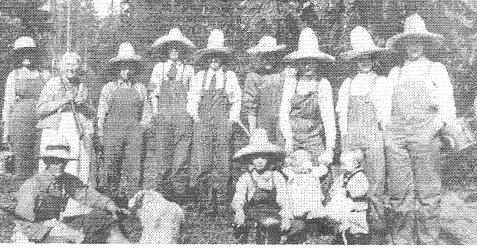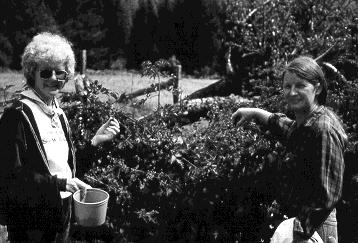Blind Family Going Berry Picking - Photograph - See Bottom of this page
Mary Herring and Judy A. Remmick-Hubert Berry Picking in Oregon
"GERMAN BLACKBERRIES"
[Garden Huckelberries]
by
Irma A. Waggoner
Many of the German-Russian people raised the small German blackberries, or black nightshade, sometimes incorrectly called wonderberries, sunberries or garden huckleberries. They are completely different from the common blackberry. In German they were called "Schwartzenbiern", "Schwartzbeeran" or "Schwarzer Nachtschatten". The botanical name for these berries is Solanum nigrum*, black nightshade, one of 90 species of Solanum. Immature berries and foliage are toxic, but ripe fruits are edible. These berries should not be mistaken for deadly nightshade (Solanaceae atropa belladona), which looks very similar. There is a similar cultivated variety, (Solanaceae melanocerasum All.), much larger than the original or wild blackberries, called "Garden Huckleberries", available from seed catalogs.
I assume the seeds were brought over from Russia, although I have not seen documentation on this. I did read one article about picking the wild wonderberries growing in the ravines near one of the Volga villages in Russia. This could have been the same berry. I imagine they were called wonder- berries because they spread so readily. My Mother sometimes referred to the berries she raised in her garden as wonderberries.
In western Nebraska where we lived, each spring the blackberries came up everywhere, "thick as the hair on a dogs back", (as my Mother would say). When we hoed the garden we were taught to chop out all but a few of the larger plants, leaving them in areas where the other seeds had come up poorly. Birds loved these blackberries and seeds were deposited in many places from bird droppings. We were always careful to weed out the stray plants from the crops, as the ripe blackberries would stain the dry edible beans when they were harvested, resulting in a lower grade for the crop.
When the clusters of berries, about 1/4" across, began to ripen, they would turn from green to purplish to a glossy jet-black color. If the plant had received adequate water, a picker could fill a container in a short time, that is if the picker didn't gorge him self on the berries while picking!
My Mother referred to me as her champion blackberry picker, as I didn't care for the flavor and didn't eat any of the berries I picked! Sometimes a picker carried a wooden stool to the patch, as squatting down to pick the berries was hard on the back and knees.
From these berries my Mother made blackberry jam, pies, dumplings and kuchen. Since I wouldn't eat blackberry dumplings, "gefulte Klosse", (also called Schwartzbeerenmaulaschen ), my Mother would also make cottage cheese-filled dumplings. She mixed a dough and rolled it out, cutting it into squares, which she filled with the sweetened berries, then she pinched them shut and dropped them into boiling water. When they floated to the top, she took them out and put them in a bowl to be covered with a sauce of cream and toasted buttered breadcrumbs. The cheese dumplings were filled with homemade seasoned cottage cheese.
Because her kuchen recipe made one large pan, or two 10x13 pans, along with blackberry rivvel kuchen, my Mother sometimes made a second kind of fruit kuchen, again for my benefit.
I have to chuckle every time I think of blackberry pie. My daughter married and moved to eastern Nebraska to a community not familiar with the German blackberries. She became hungry for them and asked me to send her some seed, which she planted in her garden. Her husband was sure she was growing the deadly nightshade, which was common in their area. She picked the ripened berries and assured him he would not die if he ate the pie she had baked, as her family would have been "long gone" if the plants were poisonous. He was still skeptical and would not taste the pie, which the rest of the family enjoyed. The next day when he saw they had not gotten sick or died, he tasted the pie and pronounced it excellent!
In the early days these sweet German delicacies could only be enjoyed for a short time, but when freezers came along, the berries could be frozen for use any time. I remember the task of washing the berries and preparing them for the freezer--I much preferred picking to washing. A small amount of berries were put into cold water, then the berries with spit skins would float and were removed from the water and the seeds from the broken berries would sink to the bottom. Any unripe berries were picked out of the washed berries, which were then drained in a colander until they were dry, so ice crystals wouldn't form to make the berries watery when they were later thawed for cooking.
Another blackberry treat I learned of, but not made by my Mother, was "Gnebbles". A dough was made, and pieces were pulled off and dropped into boiling water a few minutes. They were then drained and topped with a mixture of blackberries, sour cream and sugar.
Unfortunately my Mother never "wrote" down many of her recipes, as most everything she made was from memory. Similar recipes, however, can be found in German cookbooks. German blackberries aren't grown as much any more as back when each family had a large garden. It is sad to think that our children and grandchildren may never get to savor the delicacies made from these berries.
Irma A. Waggoner
Iawagg@msn.com
7 March 2001
See: THOSE WERE THE DAYS by Lillian Hein Remmick's: Dog Days

Blind Family Going Berry Picking
in the Early 1900s
See: Rosina, nee Blind, and Reinhold Schweikert (Schweigert) Genealogy

Mary Herring (left) and I picking wild black berries in Oregon 1985





